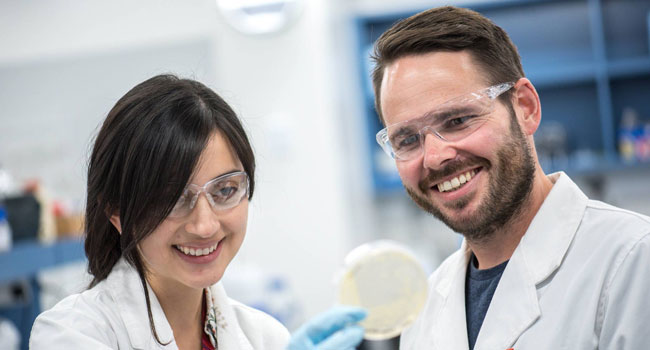Researcher profile: Dr Andrew Care

An early-career cancer researcher and his young team in Sydney are developing new biotechnology that could help deliver more targeted cancer treatments.
Dr Andrew Care is a research fellow at the Department of Molecular Sciences at Macquarie University.
With a background in synthetic biology and nanomedicine, his 2018 Early Career Fellowship from the Cancer Institute NSW is igniting his research and combining these two worlds to improve cancer outcomes.
What is the research?
Dr Care’s study is based on the development of naturally-occurring nanoparticles (microscopic particles) as a new avenue to treat tumours and other cancers at their source.
“These nanoparticles exist inside microorganisms, like bacteria – they are found in nature.”
The team uses genetic engineering to produce modified versions of these nanoparticles. In theory, these new nanoparticles can then be loaded with drugs and delivered directly to cancers in the body.
“These are different to the commonly-used synthetic nanoparticles that are currently in development or in the market,” Dr Care explains.
“We’re combining techniques from synthetic biology and nanomedicine to design, engineer, and produce these new protein-based nanoparticles.
“In our lab, we have the potential to custom-engineer these nanoparticles to treat a specific type of cancer.
“However, the goal is to produce a launch pad for new treatments; something that has the potential to go beyond targeting just one type of cancer.”
The progress so far

“It's been a formative year to date,” reports Dr Care. “The research is still in its early stages, but things have taken off quickly.”
The team are now starting to generate data, with “exciting” results beginning to arrive.
Their first paper was recently published in Genes – a review on protein-based nanoparticles and how to engineer them for different practical applications, including cancer nanomedicine.
“We have a clear vision of where we want to take our technology and the problems we want to solve,” says Dr Care of his research team, which includes PhD students Dennis Diaz and Febrina Sandra.
“It's really exciting to be working with these students. They're really smart, they're teaching me, and they're really hard working.
“By the end of my three-year Cancer Institute NSW fellowship, I hope we’ll be testing our protein-based nanoparticles in animal models and talking about their clinical translation.
“It would be great to see more of these unique nanoparticles being developed and translated into the clinic. I think that will eventually become a reality.”
Dr Care is a member of Sydney Vital, the St Leonard’s-based Translational Cancer Research Centre who are also providing a research scholarship to his PhD student Dennis Diaz.
Further research support is coming from ARC Centre of Excellence for Nanoscale BioPhotonics (CNBP), and the Commonwealth Scientific and Industrial Research Organisation (CSIRO).
The next round of Cancer Institute NSW fellowships will open in early–to2019. Sign up to receive our free Cancer News e-newsletter each month for the latest updates.
